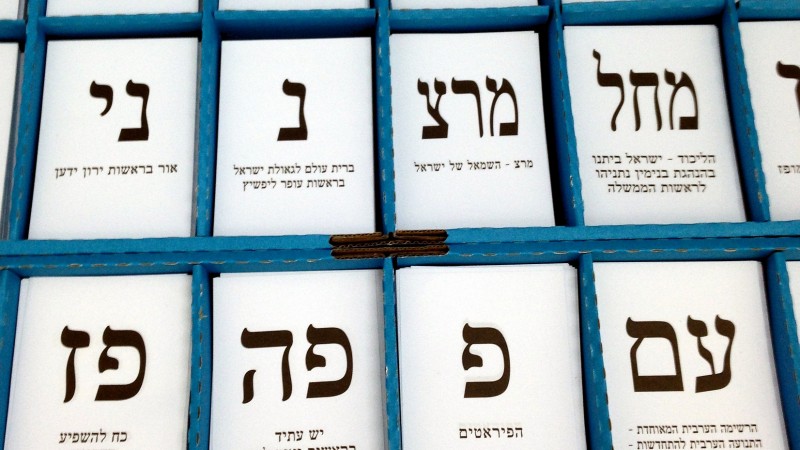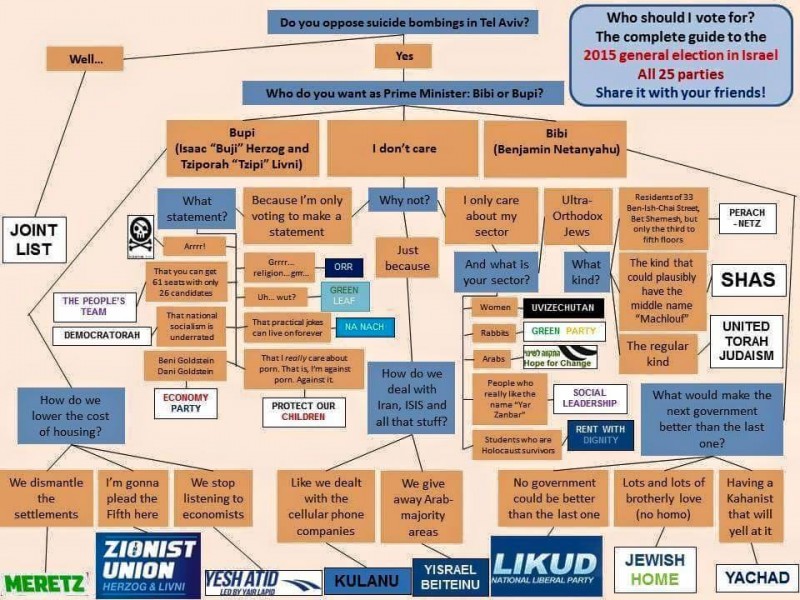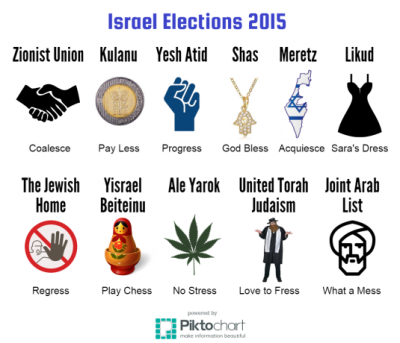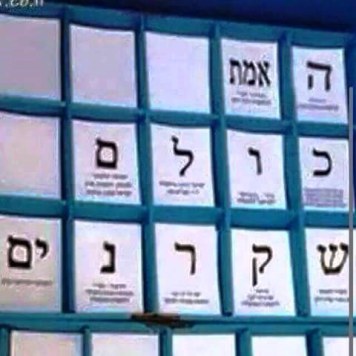
Israel elects its next Knesset on March 17, 2015. Pictured: party ballots from 2013. Source: Danny Zelazo on Flickr (CC BY-NC-SA 2.0).
Only hours before the polls open in Israel this morning, March 17, 2015, for the 20th election of the Israeli Knesset (parliament), the major candidates for prime minister are still making game-changing announcements.
Sitting Prime Minister Binyamin (“Bibi”) Netanyahu declared:
“I think that anyone who moves to establish a Palestinian state today and evacuates areas is giving radical Islam an area from which to attack the State of Israel.” Adding, “If [political opponents] Tzipi [Livni] and Buji [Isaac Herzog] set up the next government, Hamastan 2 will be established on these hills.”

Netanyahu's election sticker: “It's us or them. Only the Likud [Party]. Only Netanyahu.”
Within hours, Tzipi Livni, the top seat of the HaTnua (“Movement”) Party and a leading member of the joint electoral coalition, the Zionist Union, announced she would relinquish her plans with partner Isaac (“Buji”) Herzog to hold a joint prime ministerial seat in which Herzog would serve the first two years and Livni would assume the seat thereafter. The decision to remove the shared seat option was intended to eliminate controversy, swaying swing voters in the final hours of decision making.
On citizen media, Yair Zivan noted that not all politicians spent the last hours of the campaign focused on the overarching issues. He cited Yesh Atid's (“There is a Future”) top candidate Yair Lapid, who prioritized personalized voter communication.
24 hours before polls close and @LapidAtid is answering questions from voters on his Facebook page. Over 1500 comments in 20mins #Israelex
— Yair_Zivan (@Yair_Zivan) March 16, 2015
Responding to recent events, Yair Rosenberg tweeted:
What I love about Israel's elections: unlike America's, there's still the magic of surprise on the day, as polls can't tell us who'll win.
— Yair Rosenberg (@Yair_Rosenberg) March 16, 2015
Avi Mayer, one of the Israeli blogosphere's most vocal advocates, echoed:
With 11 hours to go until polls open here in Israel, the parties are still fighting for every vote. Exhilarating and exhausting. #IsraElex
— Avi Mayer (@AviMayer) March 16, 2015
On December 8, 2014, the Israeli Knesset voted to dissolve the sitting government and schedule new parliamentary elections. Parties running for election range from far left to extreme right, from a joint Arab party ticket to the religious conservatives, Shas. Each party must reach a threshold of 3.25 per cent of the vote — a controversial move that limits representation of the smaller parties in the Knesset.

Google Israel's Election Day doodle illustrates the ballot box. (Source: March 17, 2015.)
This short, friendly video provides a comprehensive overview of the process. Every citizen over the age of 18 has the right to vote. Election Day is a national holiday, free from work and school, and all you need to do to vote is show up at your polling place with your national identification card. (If you don't remember where you voted last, go to this website and enter your ID number; Hebrew). Unlike other countries, no pre-registration is required. The 11,000 polling stations around the country are open from 7 am until 10 pm.
Israelis vote by selecting a paper ballot with their chosen party's name from a tray, placing the ballot in an envelope, which they seal and insert into a locked box. An election oversight committee is present in the voting room should any questions arise. Only one person can enter the room at a time and voting is done behind a screen or curtain to ensure privacy.
This is the first year that Arab parties will run on a united platform. Known as the Joint List, Balad, Hadash, Ta'al, and the United Arab List agreed to combine agendas to ensure they would reach the voting threshold, maximizing their Knesset representation and limiting the ability of Netanyahu's Likud party to form a parliamentary coalition. They are expected to reap a maximum of 15 seats.
Left-wing journalist Noam Sheizaf opines:
Dream scenario tomorrow: Joint List wins 15 seats & due 2 rising participation, Liberman stays out of the Knesset #IsraelElections
— noam sheizaf (@nsheizaf) March 16, 2015
Avigdor Lieberman is the founder and head of the “ultra-nationalist” Israel Beiteinu (“Our Home”) party and the current Minister of Foreign Affairs.
The V15 Campaign (Hebrew) (“V” for victory) was formed with a similar strategic agenda: to oust Netanyahu, as evidenced by its motto, “Anyone but Bibi.” A combined effort of the Zionist Union, the Arab list, Meretz (“Vigor”), and other leftist parties, the campaign's most famed political drama was sending a moving van to Netanyahu's home in February. In the words of activist Hagai Hirschfeld:
He will have to move in a month, so we came to help him. Bibi’s lived here too long. We have already packed his corruption, his indecision, and his lies, so all he has to do is stand up and leave.
Despite the theater of the campaign, a significant portion of voters are still undecided. The Times of Israel‘s Raphael Ahren reported on Twitter:
18 percent of Israeli voters are still undecided, election researchers tells me #IsraElex
— Raphael Ahren (@RaphaelAhren) March 16, 2015
Khulud Khamis, who works for the Arab feminist organization Kayan and is the author of the new novel Haifa Fragments, which offers a nuanced look at Arab women's lives in Israel and Palestine, explained her struggle deciding how to vote — or if she should vote at all:
To vote or not to vote. That is not the question. The Joint Arab List has at first thrown me into confusion. I’ve always perceived voting as a personal responsibility as a citizen. But for the first time in my life, I had my doubts. I was confused. How can I vote for a list that has Islamists and nationalists and polygamists in it? So I decided I would not vote.
But as the days passed, I realized that more than a responsibility, voting is my right. And it is a hard-earned right that women before me struggled for on my behalf. How can I not vote?
… I am voting for the Joint Arab List because I’m sick of the old. With all its challenges and problematic aspects, I think it’s time to embrace change and uncertainty, because the old ways surely didn’t get us anywhere. So I am giving a chance, in the hopes that it will lead to change. Sometimes, we have to stride forward, change direction, and embrace uncertainty.
Even for those whose votes are decided, there is no obvious choice. Jen of Tel Aviv reported a family split at the voting booth:
Tomorrow our family of 4 is going to vote; at least 3 political parties involved. Will it make a difference? #IsraelElections
— JenT (@wysiwygjt) March 16, 2015
Popular blogger The Muqata posted a flow chart for those in search of electoral guidance, commenting, “Now it all makes sense.”

Enjoying the action, blogger Adam Vinokoor, contributed his own infographic to explain partisan woes.

The eponymous blogger of Anne's Opinions posts this visual, rearranging the paper ballots to spell out: “The truth – they are all liars” (“האמת – כולם שקרנים”):

Interestingly, “truth” or “אמת” is the ballot symbol for the Zionist Union.
The highest priority issue of the election appears to be security of the state, followed closely by its umbilical twin, Jewish/national identity. But socioeconomics are not easily forgotten by the voters. Noga Tarnopolsky reminds us of Israel's economic reality:
If Netanyahu loses power, this is why #IsraElex pic.twitter.com/qKdPUEWE26
— Noga Tarnopolsky (@NTarnopolsky) March 14, 2015
Despite the fanfare, the voters’ energy is positive. As we head into Election Day, journalist and blogger Sarah Tuttle-Singer's, “Guess Who I'm Voting For?” best illustrates the country's optimism.
And most of all, I am voting for the country that our founders imagined — a homeland based on exquisite principles of equality, fairness, and righteousness — the very values that are steeped in our ancient culture and peoplehood, culled through our own varied histories… values that honor the fundamental dignity of others who may believe different things and pray in different languages.
This election matters — we have reached a point where we must show the world who we are. And we must hold the mirror up to our own face, and hope we may like it enough to smile back.
So, yes, I am voting.
And I’ll tell you who I’m voting for:I am voting for Israel.
Follow Election Day updates on social media at: #IsraelElections, #IsraElex (the original election hashtag), and #IsraelElex.







1 comment